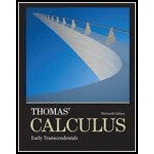
In Exercises 5 and 6, the transition matrix P for a Markov chain with states 0 and 1 is given. Assume that in each case the chain starts in state 0 at time n = 0. Find the probability that the chain will be in state 1 at time n.
5.
Want to see the full answer?
Check out a sample textbook solution
Chapter 10 Solutions
Thomas' Calculus and Linear Algebra and Its Applications Package for the Georgia Institute of Technology, 1/e
- Explain how you can determine the steady state matrix X of an absorbing Markov chain by inspection.arrow_forward12. Robots have been programmed to traverse the maze shown in Figure 3.28 and at each junction randomly choose which way to go. Figure 3.28 (a) Construct the transition matrix for the Markov chain that models this situation. (b) Suppose we start with 15 robots at each junction. Find the steady state distribution of robots. (Assume that it takes each robot the same amount of time to travel between two adjacent junctions.)arrow_forwardConsider the Markov chain whose matrix of transition probabilities P is given in Example 7b. Show that the steady state matrix X depends on the initial state matrix X0 by finding X for each X0. X0=[0.250.250.250.25] b X0=[0.250.250.400.10] Example 7 Finding Steady State Matrices of Absorbing Markov Chains Find the steady state matrix X of each absorbing Markov chain with matrix of transition probabilities P. b.P=[0.500.200.210.300.100.400.200.11]arrow_forward
 Linear Algebra: A Modern IntroductionAlgebraISBN:9781285463247Author:David PoolePublisher:Cengage Learning
Linear Algebra: A Modern IntroductionAlgebraISBN:9781285463247Author:David PoolePublisher:Cengage Learning Elementary Linear Algebra (MindTap Course List)AlgebraISBN:9781305658004Author:Ron LarsonPublisher:Cengage Learning
Elementary Linear Algebra (MindTap Course List)AlgebraISBN:9781305658004Author:Ron LarsonPublisher:Cengage Learning

